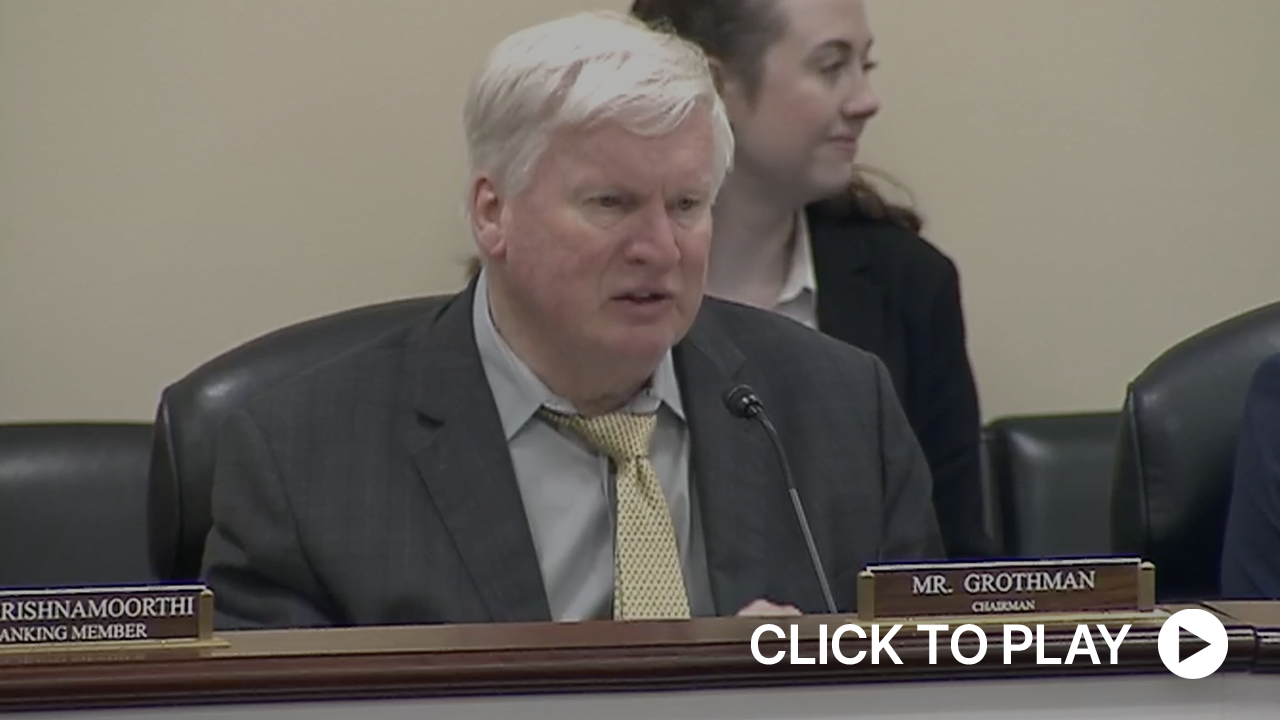
Grothman Opens Second Hearing on Examining the Growth of the Welfare State
WASHINGTON—Subcommittee on Health Care and Financial Services Chairman Glenn Grothman (R-Wis.) delivered opening remarks at today’s hearing on “Examining the Growth of the Welfare State, Part II.” In his remarks, Subcommittee Chairman Grothman highlighted the waste, fraud, and abuse that permeates rental assistance welfare programs, and emphasized the need to reform them. He noted that our bloated welfare system dissuades Americans from getting married, creates disincentives to work, and continues the cycle of government dependency. At today’s hearing, the panel will hear from experts in federal rental assistance programs and will investigate ways to save American taxpayers’ money.
Below are Subcommittee Chairman Grothman’s prepared remarks.
Welcome to the Subcommittee on Health Care and Financial Services’ second hearing of the 119th Congress.
At our last hearing, we learned about some of the senseless and harmful disincentives in our welfare programs.
The fact is the federal welfare system is full of the wrong incentives and disincentives.
It discourages marriage and hard work, while at the same time encouraging dependency.
It costs taxpayers more than one trillion dollars annually while failing to efficiently lift people out of poverty.
Today’s Part Two hearing will provide an opportunity to hear from three witnesses who are experts in federal rental assistance programs, including Dr. Ben Carson, the former Secretary of the Department of Housing and Urban Development.
These programs are textbook examples of good intentions that have gone awry.
For example, Section 8 housing vouchers and public housing programs contain marriage penalties, which can make it economically foolish to get married.
In many cases, individuals risk losing their Section 8 voucher if they get married and their combined household income increases beyond the threshold.
As we discussed during Part I, marriage and a strong family unit are well-established to help lift and keep people out of poverty.
Numerous studies have shown that children raised in single-parent households are at heightened risk for substance abuse, crime, dropping out of school, depression, anxiety, and other disorders.
And yet, our current welfare system, including housing assistance programs, discourage marriage.
Due partially to these penalties, the percentage of children born to unmarried women has skyrocketed.
In 1960, around 5 percent of children were born to unmarried women.
Today, that number is around 40 percent.
Like marriage, the current system discourages rental assistance recipients from seeking employment, higher wages, or overtime if the increased income pushes them out of eligibility.
We are fostering a cycle of dependency on government assistance.
The average Section 8 tenant spends 10 years on the program, and the average public housing tenant 12 years.
Welfare also often benefits middlemen and the administrative state more than the low-income Americans it purports to be for.
The Section 42 Low-Income Housing Tax Credit provides developers with tax incentives to build affordable housing for low- and moderate-income people.
Yet, the program’s complicated design mostly benefits developers, law firms, accounting firms, and state bureaucrats.
Middlemen and administrators can take advantage of Section 8 and public housing as well.
The Milwaukee Housing Authority reported in January that its leadership misused 2.8 million federal dollars intended for tenants to pay its staff.
The problem had apparently been ongoing since 2019 but wasn’t caught for 6 years.
Meanwhile, taxpayers are on the hook for more and more spending on welfare programs each year.
Rental assistance programs alone account for more than 53 billion dollars of federal spending each year.
And nearly every problem we will discuss today also applies to dozens of other programs and hundreds of billions of taxpayers’ dollars.
We owe it to our constituents to be responsible stewards of their hard-earned money.
During a recent interview, Senator Schumer criticized our constituents for expecting this of their elected officials.
He said, “Their attitude is, ‘I made my money all by myself. How dare the government take my money from me?’”
To that I say, how could Americans not be frustrated by a system that steals their hard-earned money and wastes it on programs which are needlessly inefficient, and which erode the strength of the American family?
We must earn back their trust.
To do that, we must attempt to disentangle the web of welfare programs and find ways to fix it.
I hope today’s discussion will provide an opportunity to learn more about how the current housing assistance system is failing taxpayers and program participants alike, and how we might fix it.
And, with that, I yield to Ranking Member Krishnamoorthi for his opening statement.
Distribution channels: U.S. Politics
Legal Disclaimer:
EIN Presswire provides this news content "as is" without warranty of any kind. We do not accept any responsibility or liability for the accuracy, content, images, videos, licenses, completeness, legality, or reliability of the information contained in this article. If you have any complaints or copyright issues related to this article, kindly contact the author above.
Submit your press release
